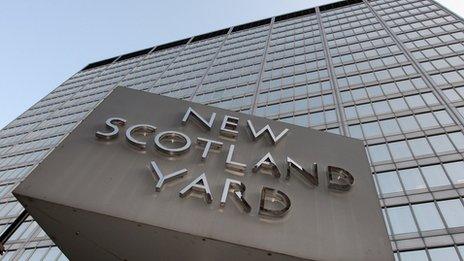Khuram Shazad Iqbal faces jail for extremist online posts
- Published

Khuram Shazad Iqbal will be sentenced in the next few weeks
A student calling himself the "father of terrorism" faces years behind bars after admitting posting more than 800 links to extremist material online.
Khuram Shazad Iqbal, 21, of Cardiff, was convicted at Woolwich Crown Court in London of using Facebook and Twitter to spread videos and articles.
Iqbal was arrested three years ago in Kenya over alleged links to Somali militants.
His online name was Abu Irhaab, Arabic for father of terrorism.
When interviewed, Iqbal claimed it was "just a name he thought of" and said he had never checked its meaning.
Iqbal, who is from the Canton area of Cardiff, used internet sites to spread extremist videos and articles, and also tried to sell documents that glorified terror online, using six different Facebook pages.
When police searched his laptop they found nine copies of the al-Qaeda magazine "Inspire".
One issue featured an article "How to make a bomb in the kitchen of your mum", along with instructions on handling an AK2 assault rifle and how to make and detonate a fire bomb.
'Displayed signs of radicalism'

Police also found a magazine dedicated to Osama Bin Laden on Iqbal's laptop
Three years ago, in 2011, Iqbal was one of two men from Cardiff arrested near the Kenyan border.
Both men were questioned by counter terrorism police when they arrived back in the UK and were released without charge.
"Both had displayed signs of radicalism prior to travelling," said prosecutor Roger Smart, who explained their families had reported them missing on 8 October of the same year.
But Nathan Rasiah, defending, said it was a "big leap" to say his trip was for terrorism purposes.
The court also heard that on 1 August 2012 Iqbal made a second attempt to "join the terrorist cause", this time by flying to Turkey with two friends.
But the group were halted at Heathrow airport and the trip, which Iqbal claimed was a holiday, was aborted.
Six months later, in January 2013, Iqbal changed his name to Aadam Qaqa Shahin, allegedly to obtain a new passport to evade his father's control.
Following the failed Kenya trip, Iqbal was enrolled with the government "Prevent" programme - engaging in weekly meetings with Islamic scholars to help him move away from extremist views.
But during his engagement with the program Iqbal posted links to 848 examples of extreme content on the internet.
'Radicalised by influences'
They included links to sermons by hate preacher Abu Hamza, videos of Western men fighting jihadist causes with calls to arms and videos showing training camps in Syria.
"It is the prosecution's case that the significance of the chosen username cannot be ignored when considering whether the defendant intended to encourage terrorism,' said Mr Smart.
But Mr Rasiah said: "This is not someone who is creating some form of extremist handbook, he is looking at material and it is being reposted.
"He is subject to that same material himself and we accept that he propagates it by reposting it.

Iqbal was arrested in Kenya in 2011 - the border with Somalia is home to the Islamist al-Shabaab militants
"In summary the defence's position would be that Khuram Iqbal is a young man who has, on the evidence, been radicalised by influences that he had upon him.
"He has accepted his guilt in relation to these matters and he is far from beyond redemption."
Iqbal, who is described by his father as a 'quiet boy', suffers from panic attacks, paranoia, and anxiety disorder leaving him 'a target for radicalisation', the court hard.
Iqbal admitted dissemination of terrorist publications and possession of information likely to be useful to a person committing or preparing an act of terrorism.
He was remanded in custody and will be sentenced at a hearing within the next three weeks.
Judge Christopher Kinch said: "It is plain that there is a potential for overlap between cases where the recklessness demonstrated is so grave that it would overlap with intention."
- Published21 October 2011

- Published20 October 2011
- Published19 October 2011
- Published18 October 2011